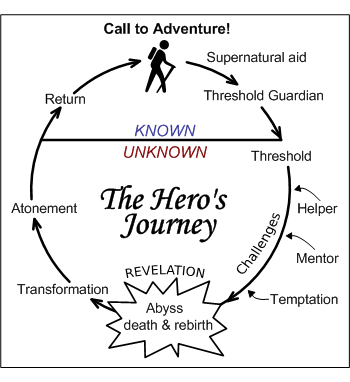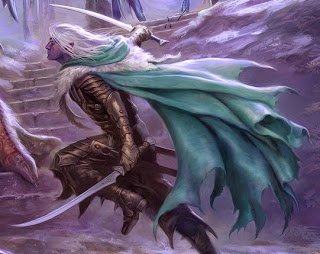Header Image Translated: "I'm not willing to compromise or examine something from another perspective because empathy is for Communists!"
Last week I had a delightful chat with James D'Amato from the One Shot Podcast: He's a really stellar storyteller who is both eloquent and well-versed in game theory. One of the subjects that we were discussing is the concept of character growth in tabletop role-playing games. Fortuitously, I also got to see the new Avengers: Age of Ultron at the midnight release. I'm not going to spoil the story for any of you readers, so don't worry about that, but I do have a pretty serious beef with Captain America because of the way he's written. I realized then that the concepts that I revile in Cap are the same attributes that can be found in player characters that are detrimental to the narrative progression of a game.
I'm going to talk about the movie first.
I figured out what his superpower is. It isn't super strength or anything physical. Cap's ability is to be Super Right. All the time. Any decision he makes or stance he takes is the right one: everyone on the other side of the argument is invariably going to be proven wrong. There's no middle ground or gray areas with him, and because of that, he never has any kind of doubts or insecurities... so he never gets to change or grow as a character. He is a static concept of idealism and a hero that never falters. The most interesting and dynamic characters are those that interact with Steve Rogers and are changed as a result of that interaction, but never Rogers himself.
In your RPG games, do you want to be the interesting character, or the one that never changes?
Let's use an example: in The Winter Soldier Steve and Natasha Romanov go in to capture a terrorist and rescue some hostages. Just when Steve is about the deal the final blow and capture the terrorist, he sees Romanov downloading some files from a computer and goes off on her about how it isn't part of the plan. During his high horse tirade, the terrorist escapes. Steve has the balls to tell Romanov that if she had just stuck to the plan then the mission would have been successful. Then, poor Romanov has to say "Okay, that one is on me." He could have wrapped up the guy in a neat bow and there would have been no problem, but because he's Captain America, his lack of focus is Romanov's fault.
When it comes to narrative, whether it be book, movie, oral tradition, comic book, or a dirty limerick on a bathroom stall, the most engaging and interesting characters are those that undergo change and develop, either growing into a hero or descending along a dark path to villainy. Captain America doesn't ever do that, and as a result I think he's a truly boring character, just like Superman.

At some point you have to admit that you've learned something, or you're no hero in my book.
As a smooth segue into roleplaying games, the structure of many games encourages the players to follow the same static character plan as Cap has. They are rewarded mechanically for maintaining an alignment, and punished if they deviate from it. Growth is only allowed when it's a statistical metric like learning a new spell or getting stronger. Granted, that power fantasy of forever striving to become better than one was before is a massive part of the game, and I won't knock it. However, I feel that often the personal plot of a PC is neglected, so games become more shallow and theme-park-y as a result, with the players wandering from interesting place to interesting place, solving problems and not having it impact them beyond finding a sweet new +2 Longsword.
On a related note, James told me that in the very first test game of Castle Blackmoor, the very first pseudo-role-playing system, the game master, Dave Arneson thought it was a total disaster because the party did a whole ton of stuff that he was never prepared for... but then they came back begging for more. It's reassuring to me to know that the hobby started off in flames, and I'm continuing that proud tradition.
If you are a player or a game master, I highly encourage you to try and think of ways that characters can progress as actual people. Ask to be challenged emotionally as well as physically. Make those hard decisions and accept the consequences. Make mistakes, and learn from them. Storytelling is a group experience, and as a player you can have as much of an input as the game master. One method you can try when you're writing up a new character is to build in some serious emotional flaws, like fears or hatreds, and work on overcoming them. Starting out perfect doesn't leave you anywhere to go.

As much as a cliche as Drizzt's become in Dungeons and Dragons, part of why he became so popular was because of his inner and outer struggles with his own society, culture, and rage. Internal conflict can be as important as outer struggle.
Flaws and detriments are mechanically inherent in some games, like the White Wolf system or GURPS. Personally, I often take more disadvantages than I can mechanically benefit from just for the flavor of the character. Earning enough experience to buy away those flaws in a moment of dramatic epiphany is intensely satisfying, such as the moment when my paladin-esque idealist character had to make the decision to buy off his pacifism flaw in order to kill a long running enemy. Was it the right thing to do? Maybe not, but it was so cathartic to finally cut loose, and a more emotionally charged killing than someone who started off with a willingness to fight to the death.
Sure, games and stories often need a Captain America-esque character to steer the rudder, to be a guiding light for others to make decisions for or against. But remember what's fun about stories, especially ones you get to play out next to friends: you have to grow and change to make the story feel more alive and fun.
I'm hoping you found this article helpful. If you want to talk to me about this in more detail, hit me up @DKjolner. I'd love to see our server develop some character, so consider donation to our Patreon. Finally, check out James D'Amato at Oneshotpodcast.com, because he's got a ton of cool stuff going on, and he'll be launching a new RPG system called Epiphany soon alongside a Patreon of his own. I recommend it highly.